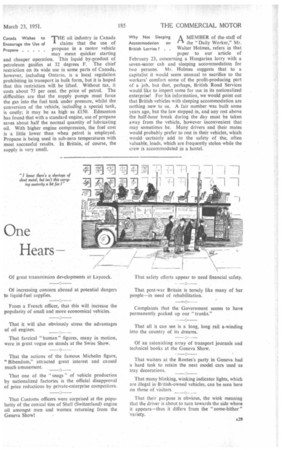Passing Comments
Page 30

Page 31

If you've noticed an error in this article please click here to report it so we can fix it.
Advice on Posts by nUIUNG 1950, engineers Engineers' AppointI-1 enrolled on the register of ments Bureau . . . the Professional Engineers' Appointments Bureau, 9, Victoria Street, London, S.W.1, fell gradually from 541 to 409. Of the latter number, 87 were civil, 207 mechanical and 115 electrical. The average number on the register was, however, 471, compared with 462 during 1949. The main work has been concerned with those already in employment whilst the majority of the unemployed was over the age of 45. The real shortage now is of first-rate men, particularly those with highly specialized experience and outstanding academic qualifications. The major difficulty in placing them is the location of employment. Due to the shortage of housing, they are naturally reluctant to leave their present homes, and this limits the number of positions for which they can be nominated. It is noticeable that a large proportion on the register specify minimum salaries much in excess of those offered by employers when notifying vacancies. The demand exceeds the supply, and employers could assist by avoiding requests for qualifications and experience beyond those essential for their requirements. Thus, properly assessed salaries co-related to the responsibility involved could be more easily equated to the requirements of A28
the candidates. A considerable proportion of the
overseas vacancies advised are in the Middle and Far East, India and Pakistan. More positions could be filled if the upper-age limit given by employers were to be increased.
Points on the Use nURING the discussion
of Sandwich L" which followed the recent
Materials paper by Mr. F. C. Lynam on sandwich materials' for bodybuilding, one of the points raised was a difficulty with aluminium floors. It appears that when trollies are frequently wheeled over these, the material is apt to stretch. In reply to a question, Mr. Lynam said that whilst at the moment special sandwich materials were more expensive than others, they were stronger and lighter, and with high production he considered that bodies could be built at lower costs, for much larger panels with fewer standards could be used. Following a reference to possible welding difficulties, he agreed that the Nelson method of stud welding could be employed on the skins. This is a special form of butt welding by which the stud or pin is literally "shot" on to thin material, thus obviating the spreading of heat and consequent melting of the surrounding base metal.
Canada Wishes to THE oil industry in Canada Encourage the Use of claims that the use of Propane propane in a motor vehicle
may mean quicker starting and cheaper operation. This liquid by-product of petroleum gasifies at 32 degrees F. The chief restriction on its wide use in some parts of Canada, however, including Ontario, is a local regulation prohibiting its transport in bulk form, but it is hoped that this restriction will be lifted. Without tax, it costs about 75 per cent. the price of petrol. The difficulties are that the supply pumps must force the gas into the fuel tank under pressure, whilst the conversion of the vehicle, including a special tank, is costly; it may be as high as £150. Edmonton has found that with a standard engine, use of propane saves about half the normal quantity of lubricating oil. With higher engine compression, the fuel cost is a little lower than when petrol is employed. Propane is being used in sub-zero temperatures with most successful results. In Britain, of course, the supply is very small.
Why Not Sleeping A MEMBER of the-staff of Accommodation on I-1 the "Daily Worker," Mr.
British Lorries Walter Holmes, refers in that paper to our article of February 23, concerning a Hungarian lorry with a seven-seater cab and sleeping accommodation for two persons. Mr. Holmes suggests that to a capitalist it would seem unusual to sacrifice to the workers' comfort some of the profit-producing part of a job, but that, perhaps, British Road Services would like to import some for use in its nationalized enterprise! For his information, we would point out that British vehicles with sleeping accommodation are nothing new to us. A fair number was built some years ago, but the law stepped in, and any rest above the half-hour break during the day must be taken away from the vehicle, however inconvenient that may sometimes be. Many drivers and their mates would probably prefer to rest in their vehicles, which would -certainly add to the safety of the, often valuable, loads, which are frequently stolen while the crew is accommodated in a hostel.




















































































